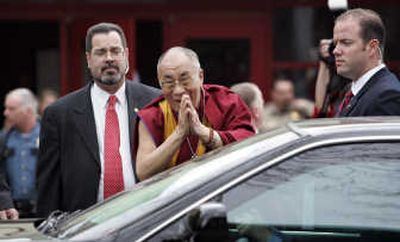Dalai Lama urges China to pull troops from Tibet

SEATTLE – The Dalai Lama said Sunday that Tibet cannot make any more concessions to China and renewed his calls for the government to cease suppression in his homeland and withdraw troops.
The exiled Tibetan spiritual leader denied Chinese claims that he has called for Tibet to be split from China and that he is behind recent turmoil, saying instead that he is committed to pursuing Tibet’s right to autonomy.
“The whole world knows that the Dalai Lama is not seeking independence, nor separation,” he said at a news conference.
The Dalai Lama, visiting Seattle for the five-day Seeds of Compassion conference, told journalists Sunday that there have been some talks between representatives of his government-in-exile and Chinese officials.
The talks date back to 2002 and some progress was made, but by July 2007 the discussions had deteriorated, he said. He did not elaborate.
Recent protests in Tibet against five decades of Chinese rule have been the largest and most sustained in almost 20 years and have fueled protests that have disrupted the global torch relay for this summer’s Olympic Games in Beijing.
“Our struggle is with a few in the leadership of the People’s Republic of China and not with the Chinese people,” the Dalai Lama said in a statement released after the press conference. “If the present situation in Tibet continues, I am very much concerned that the Chinese government will unleash more force and increase the suppression of Tibetan people.”
He said that if the Chinese stop such suppression and withdraw armed police and troops, he would advise all Tibetans to stop their protests. He did not expect his message to reach Tibet, however, because of China’s explusion of foreign journalists.
Meanwhile, China has detained nine Buddhist monks and accused them of planting a homemade bomb last month in a government office building in eastern Tibet, an official said Sunday.
The alleged bombing builds on Beijing’s claims that the recent protests were part of a violent campaign by the Dalai Lama and his supporters to overthrow Chinese rule in Tibet and sabotage the Beijing Olympics in August.
Scholars say China’s accusations help the government justify its crackdown and demonize the opposition while driving a wedge between the government-in-exile and groups like the Tibetan Youth Congress that have challenged the Dalai Lama’s policy of nonviolence.
In his almost hour-long address on Sunday, the Tibetan leader touched on several points surrounding the situation in Tibet and China.
The Tibetan leader repeated that if violence continues in Tibet, he would resign. But he criticized China’s attempt to suppress demonstrations, adding that people have the right to express their feelings. He encouraged, however, any Tibetan protesters to conduct nonviolent demonstrations.
The Dalai Lama said he supports China’s ambitions to become a world superpower, saying that the country has achieved the economic and military levels to do so, but lacks transparency. He said that if China wants to be a superpower, it needs the world’s trust.
“Particularly in China, everything is state secret. I think these practices are outdated,” he said.